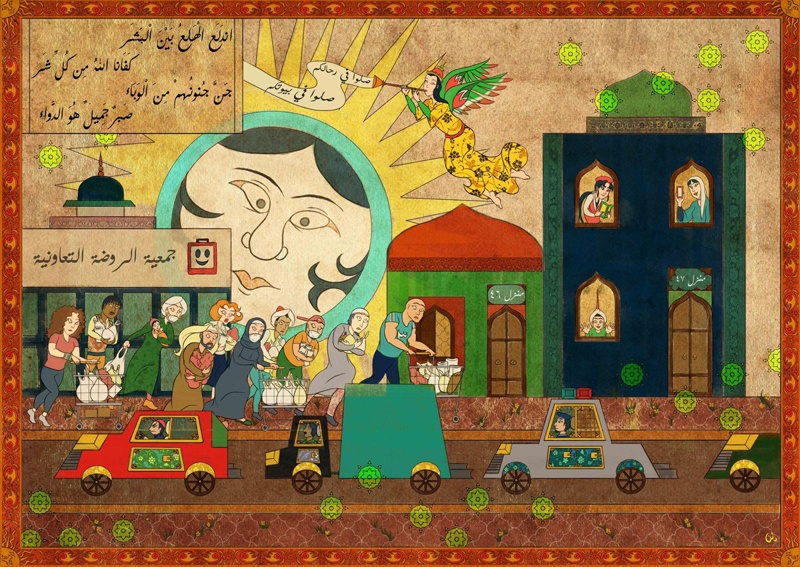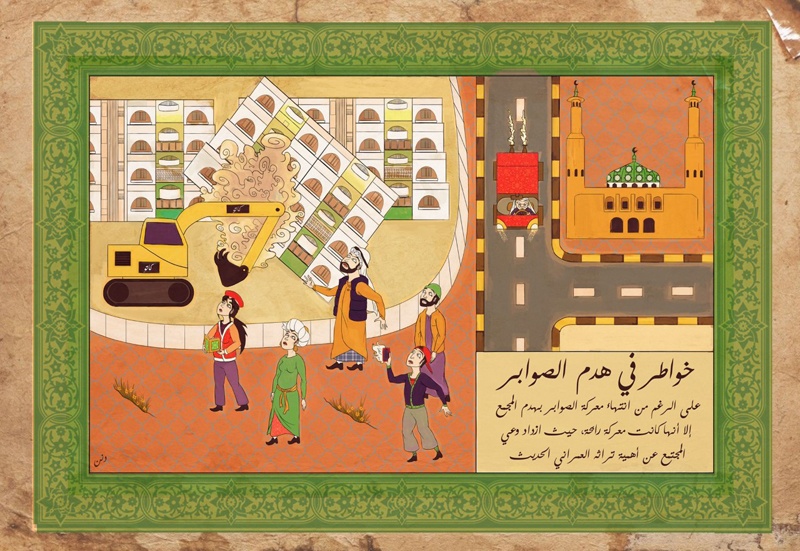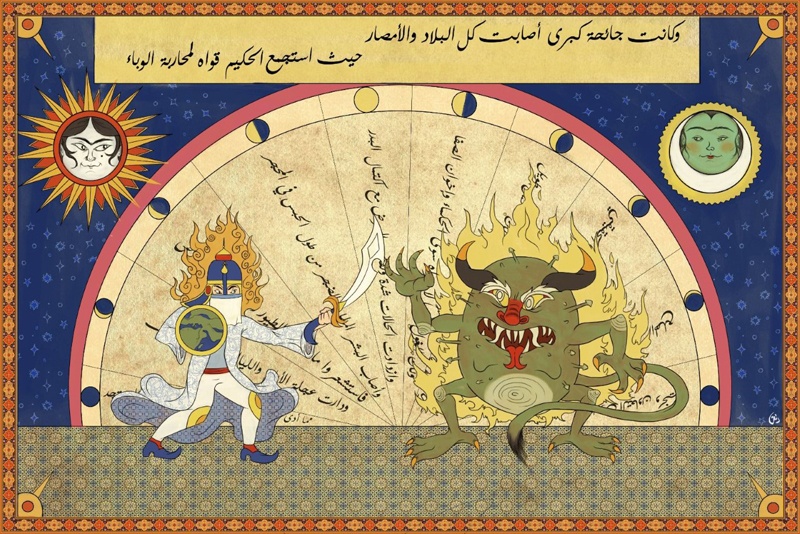 KUWAIT: 'The Spread of Panic' miniature deals with COVID-19 chaos. The artwork is owned by the Khaleeji Art Museum. - KUNA photos
KUWAIT: 'The Spread of Panic' miniature deals with COVID-19 chaos. The artwork is owned by the Khaleeji Art Museum. - KUNA photosKUWAIT: At first glance, miniatures created by artist Dana Al-Rashid seem to belong to a different era; however, with a keen eye on details, one cannot help but notice the contemporary aesthetics, evoking a sense of social awareness and activism on significant issues in Kuwait. From the documentation of now-demolished modern heritage architectures, the critique of social issues, to the coronavirus pandemic, Rashid's miniatures captured such realities with the ancient art made anew.
 Dana Al-Rashid
Dana Al-RashidIn an interview, Rashid said that she began drawing miniatures in 2020 with her work featured in the digital Khaleeji Art Museum (KAM) and elsewhere. KAM, founded by Emiratis Manar and Sharifah Al-Hinai in May 2020, is the first digital museum that promotes and supports the work of Gulf artists in the region. Commenting on her artistic choice, Rashid indicated, "I felt like using a historic style that is close to our own identity," adding that with emulating Islamic miniatures - an art form flourishing in the 13th century - people here would feel a sense of belonging and connection. On the subjects of her miniatures, Rashid, who also posts art at the @kw.miniature Instagram account, said that the work touched on several topics ranging from documentation to critique.
 'On the Demolition of Al-Sawaber' documents the fall of the housing project.
'On the Demolition of Al-Sawaber' documents the fall of the housing project.'Demolition of Al-Sawaber'
In her miniature "On the Demolition of Al-Sawaber" -- displayed at the "Architecture of Memory" (https://khaleejiartmuseum.com/Architecture-of-Memory-Digital-English) virtual gallery from September 29, 2021 to March 31, 2022 -- Rashid said that there seemed to be a misconception about the idea of historic buildings. "People think that a building has to be made or built out of mudbricks and has to be built in the pre-oil era in order for it to be valuable.
This is incorrect," argued Rashid, adding that the post-oil era saw development in many fields including architecture. In the case of Al-Sawaber Complex, the artist indicated that activists exhausted all possible legal means to halt the demolition of the facility built in the early 1980s for housing. Architects proposed ways to transform and renovate Al-Sawaber into artistic and commercial spaces to persevere it.
On "The Last Skate" miniature -- depicting in an artistic sense, the last day of the Kuwait Ice Skating Rink -- she mentioned that many people confused activists' motives towards halting the demolition of the facility as being emotional and not fact-based. "It (the rink) has a historic value," affirmed Rashid, an architect by profession at the National Council for Culture, Arts and Letters (NCCAL) tasked with historic buildings preservation.
The ice skating rink, constructed in the late 1970s in cooperation with France, opened as a facility in the early 1980s to cater to the leisure needs of the population. It was considered as one of the first facilities of its kind in the Middle East. As part of her job, Rashid took measurements of the ice skating rink before its demolition. She decided to commemorate the memory of the building by beautifully drawing the very last ice skating session.
 'Al-Hakim (The Wise One) and the Plague' focuses on the battle against the coronavirus.
'Al-Hakim (The Wise One) and the Plague' focuses on the battle against the coronavirus.COVID-19 pandemic
Aside from documenting architectures, Rashid commented on current issues relating to social causes and the COVID-19 pandemic. In a miniature depicting a deliveryman battling the harsh weather, Rashid noted that people sometimes took such services for granted without thinking of the challenges facing employees of the service sector. Rashid stated, "I was trying to use a color scheme that is saturated and dark... I wanted also to portray the suffocating feeling that the driver(s) may feel when they are in this suit and in dire weather situations." She said that she was glad to hear that some legislations were in the works to help deliverymen avoid hardships and better their lives.
In her depiction of the coronavirus developments, Rashid put out several works of art including "The Al-Hakim (Wise One) and the Plague" and "The Spread of Panic," the latter work was acquired by the Khaleeji Art Museum for its permanent collection. The pandemic-themed miniatures developed in concept as the situation progressed, said Rashid, adding that she looked at the piece "The Wise One and the Plague" in a new light as more pandemic-related information was revealed. On the "Spread of Panic" miniature, she said, "I wanted to capture the alarm and the fear... how surreal it was to see when you go to the groceries or like to the Co-Ops and see how many items are out of stock".
On creating miniatures, she revealed that each piece started with a pen-and-paper rudimentary sketch, which then is scanned to a computer. Afterwards, the grueling process begins, taking around 20 to 50 hours depending on the piece. The perks of working in digital media is the ability to adjust the art on command and the variety of color schemes, said Rashid, revealing that she is planning to create miniatures using regular tools.
Regarding the reaction towards her art, Rashid indicated that the feedback was mostly positive and very welcoming, stressing the need for more support within Kuwait to help push artists' visions. She said that the miniatures project had been successful, because it was impactful and was not detached from reality, adding that people liked artwork that "gives their opinions a voice" and asserted that art and activism could change people's opinions on matters of crucial importance. - KUNA








